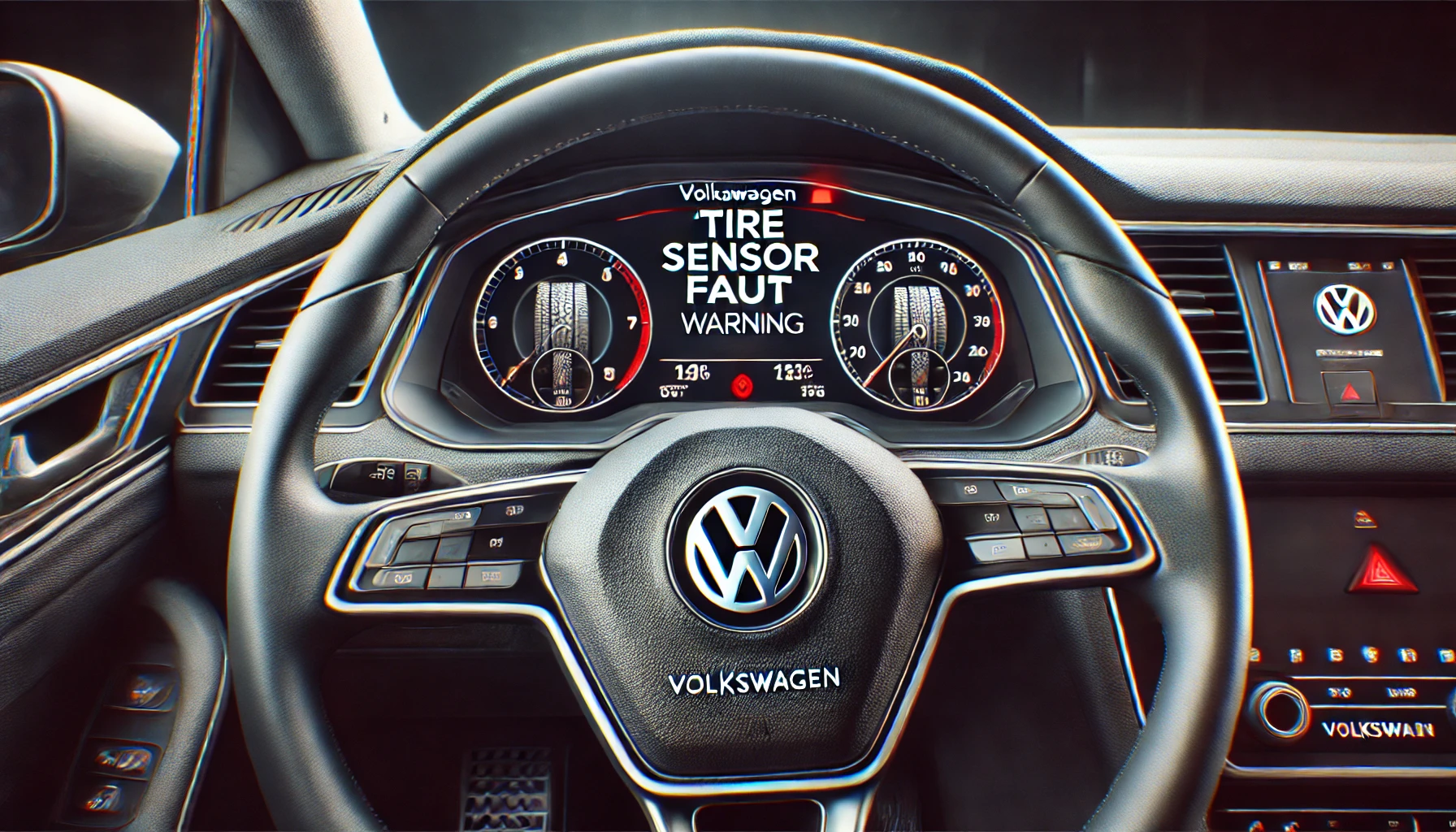
Volkswagen vehicles come equipped with a Tire Pressure Monitoring System (TPMS), which ensures that your tires are inflated to the proper levels for safe driving. If a Tire Sensor Fault warning appears on your dashboard, it means there is an issue with the TPMS system. Fortunately, most problems with tire sensor faults are minor and can be resolved easily. This article will guide you through the common causes of a Tire Sensor Fault in Volkswagen vehicles and the steps to fix it.
Common Causes of Tire Sensor Fault in Volkswagen Vehicles
A Tire Sensor Fault can be triggered by several factors in Volkswagen vehicles:
- Low Tire Pressure: The most frequent cause of a tire sensor fault is low tire pressure. The TPMS system is designed to alert you when the pressure in any tire falls below the recommended level, which can cause a fault message to appear.
- Damaged or Malfunctioning Sensors: Tire sensors can become damaged during tire changes, rotations, or from driving on rough terrain. A faulty sensor may fail to send accurate data, triggering a fault warning.
- Weak Sensor Battery: The tire sensors in Volkswagen vehicles are powered by batteries that last several years. If the battery inside the sensor weakens, it can cause the system to malfunction, leading to a Tire Sensor Fault warning.
- Radio Interference or Software Glitches: In some cases, the system can experience temporary malfunctions due to radio frequency interference or a software glitch.
- Recent Tire Service: If your tires were recently rotated, replaced, or serviced, the TPMS sensors may not have been reset properly, which can cause the system to display a fault.
Steps to Fix Tire Sensor Fault in Volkswagen Vehicles
If your Volkswagen is displaying a Tire Sensor Fault warning, follow these steps to troubleshoot and fix the problem:
1. Check Tire Pressure Manually
The first step is to manually check the pressure in all four tires using a tire pressure gauge. You can find the recommended tire pressure for your Volkswagen vehicle in the owner’s manual or on a sticker inside the driver’s door.
- Inflate any under-inflated tires to the correct pressure.
- Once you’ve adjusted the tire pressure, drive your vehicle for a few miles to allow the system to recalibrate. In most cases, the warning light will turn off after the pressure is corrected.
2. Reset the TPMS System
If correcting the tire pressure doesn’t clear the fault, you may need to reset the TPMS system manually. Here’s how you can reset the system in most Volkswagen models:
- Turn the ignition to the On position without starting the engine.
- Locate the TPMS reset button, which is typically found inside the glovebox or under the dashboard near the steering wheel.
- Press and hold the reset button until the TPMS indicator light blinks, then release it.
- Drive the vehicle at a speed of 15-20 mph for about 10-15 minutes to allow the system to recalibrate.
If the reset is successful, the Tire Sensor Fault message should disappear.
3. Inspect Tire Sensors for Damage
If resetting the system doesn’t resolve the issue, inspect the tire sensors for damage. The sensors are located inside the tire and attached to the valve stem. Damage can occur during tire changes or from harsh driving conditions.
- If you notice damage to a valve stem or suspect a faulty sensor, it will need to be replaced. A Volkswagen-certified service center or a professional mechanic can handle the replacement and recalibration of the sensor.
4. Replace the Sensor Battery
The TPMS sensors are powered by small batteries that typically last 5 to 10 years. If the sensor battery is weak or dead, the sensor will no longer function, triggering a Tire Sensor Fault warning. Unfortunately, the sensor battery itself is not replaceable, so the entire sensor will need to be replaced.
Visit a Volkswagen dealership or an authorized service center to replace the sensor and recalibrate the system to ensure proper functionality.
5. Update Vehicle Software
In some cases, a Tire Sensor Fault may be caused by a software issue in the vehicle’s onboard system. Volkswagen periodically releases software updates to improve performance and fix bugs that could affect systems like the TPMS.
If the fault persists after checking tire pressure and resetting the system, check with your Volkswagen dealership to see if a software update is available for your vehicle.
Preventing Future Tire Sensor Faults
- Regularly Check Tire Pressure: Make it a habit to check your tire pressure at least once a month, especially during seasonal temperature changes, as these can cause fluctuations in tire pressure that may trigger a TPMS warning.
- Handle Tire Sensors with Care: When having your tires rotated, changed, or serviced, ensure the tire sensors are handled carefully to avoid damage.
- Routine Sensor Maintenance: Include TPMS sensor checks during your vehicle’s regular maintenance to ensure that they are in good working condition and that the batteries are functioning properly.
- Keep Software Updated: Stay up to date with software updates for your Volkswagen to prevent any potential glitches with the TPMS system.
Conclusion
A Tire Sensor Fault in your Volkswagen may seem alarming, but it’s often a minor issue that can be resolved with basic troubleshooting. Start by checking the tire pressure, resetting the TPMS system, and inspecting the sensors for damage. If the issue persists, visiting a Volkswagen-certified service center for professional diagnostics and repair is the best solution. Regular maintenance of tire pressure and sensors will help ensure your vehicle continues to perform safely and efficiently.
